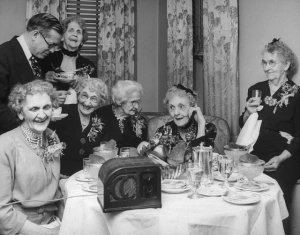A sermon preached St. Luke’s Chapel, Berkeley Seminary at Yale Divinity School, New Haven, Connecticut on Wednesday of Holy Week, 2019.
John 13:21-32
At supper with his friends, Jesus was troubled in spirit, and declared, “Very truly, I tell you, one of you will betray me.” The disciples looked at one another, uncertain of whom he was speaking. One of his disciples– the one whom Jesus loved– was reclining next to him; Simon Peter therefore motioned to him to ask Jesus of whom he was speaking. So while reclining next to Jesus, he asked him, “Lord, who is it?” Jesus answered, “It is the one to whom I give this piece of bread when I have dipped it in the dish.” So when he had dipped the piece of bread, he gave it to Judas son of Simon Iscariot. After he received the piece of bread, Satan entered into him. Jesus said to him, “Do quickly what you are going to do.” Now no one at the table knew why he said this to him. Some thought that, because Judas had the common purse, Jesus was telling him, “Buy what we need for the festival”; or, that he should give something to the poor. So, after receiving the piece of bread, he immediately went out. And it was night.
When he had gone out, Jesus said, “Now the Son of Man has been glorified, and God has been glorified in him. If God has been glorified in him, God will also glorify him in himself and will glorify him at once.”

Christian community is by definition comprised of the imperfect. Among the apostles, Thomas was a cynic. Peter was a bit reactive. Sweet John was the favorite—great for him. Annoying for everyone else. Judas was profit-motivated.
When Jesus called his apostles, he knew their strengths and weaknesses. He knew their potential, both for following him, and for betrayal. This is the nature of community and freedom.
I love you, dear Berkeley community.
When I am succumbing to a depression—or to an ethics paper—the presence of 2 or 3 of you in succession is a healing balm: one to make a cup of tea, one to hold my hand, one to proofread my paper.
“The physical presence of Christians,” wrote Dietrich Bonhoeffer, “is a source of incomparable joy and strength to the believer.”[1] The apostles were the first to enjoy such community.
They broke bread together, and, being imperfect, argued over who among them was the greatest.[2] And at the last supper, Judas prepared to do evil. “Do quickly what you are going to do,” Jesus told him, an affirmation of free will.
This month marks the 25th anniversary since the Rwandan genocide, one of humanity’s darkest periods when 800,000 people were massacred within the span of 3 months.
This past Friday, I witnessed a survivor of the genocide, Marcel Uwineza, stand before the UN General Assembly and remind them that on April 21, 1994, the UN Security Council voted—in that very room— to reduce its peacekeepers in Rwanda from 2,500 to 270, abandoning the Tutsis to a planned genocide.
Marcel lost his father, two brothers, a sister, aunts, uncles and cousins. In his words, his grandmother was thrown in the Nyabarongo River so that she might float back to Ethiopia.
During the slaughter, Marcel sought refuge in a Catholic church, but was thrown out. He hated the church for many years, but ultimately became a Jesuit priest. Fr. Marcel became a priest, he said, because, “When a house is burning—despite the risk—firefighters still go into the house to put out the fire.”
Rwanda is recovering, but the reality of that recovery is survivors living among perpetrators. The murderers were not an evil nation on the other side of the ocean, but shopkeepers, neighbors, uncles and cousins, and sometimes clergy.
The man who murdered Fr. Marcel’s siblings later approached him, fell on his knees before him and begged his forgiveness. By the power of Jesus Christ, Fr. Marcel forgave him and embraced him.

This is an extraordinary example of forgiveness, echoing Jesus’ words from the cross, “Father, forgive them; for they do not know what they are doing.” Surely, by this example, we can bear the much lighter crosses of one another’s imperfections in this community.
Again, Dietrich Bonhoeffer, “It is the fellowship of the Cross to experience the burden of the other,
If one does not experience it, the fellowship he belongs to is not Christian. If any member refuses to bear that burden, he denies the law of Christ.”[3]
By the grace of God and the example of Jesus Christ, may we practice a love and forgiveness here that we carry out of this place to heal the world.
In the name of the Father and of the Son and of the Holy Spirit. Amen.
To read more about forgiveness in Rwanda, visit Portraits of Reconciliation here.
[1] Dietrich Bonhoeffer, Life Together. (New York: Harper Collins, 1954), 19.
[2] Luke 22:24-30.
[3] Bonhoeffer, 101.

